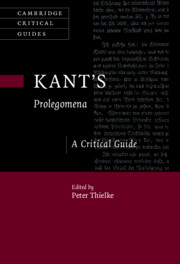Book contents
- Kant’s Prolegomena
- Cambridge Critical Guides
- Kant’s Prolegomena
- Copyright page
- Contents
- Contributors
- Abbreviations
- Introduction
- Chapter 1 Humor, Common Sense and the Future of Metaphysics in the Prolegomena
- Chapter 2 Is Metaphysics Possible? The Argumentative Structure of the Prolegomena
- Chapter 3 From ‘Facts’ of Rational Cognition to Their Conditions: Metaphysics and the ‘Analytic’ Method
- Chapter 4 Transcendental Idealism in the Prolegomena
- Chapter 5 Judgments of Experience and the Grammar of Thought
- Chapter 6 The Beach of Skepticism: Kant and Hume on the Practice of Philosophy and the Proper Bounds of Skepticism
- Chapter 7 The Boundary of Pure Reason
- Chapter 8 Kant’s Argument Against Psychological Materialism in the Prolegomena
- Chapter 9 The Marriage of Metaphysics and Geometry in Kant’s Prolegomena
- Chapter 10 Kant’s ‘As If’ and Hume’s ‘Remote Analogy’: Deism and Theism in Prolegomena §§57 and 58
- Chapter 11 Cognition by Analogy and the Possibility of Metaphysics
- Bibliography
- Index
- Cambridge Critical Guides
Chapter 2 - Is Metaphysics Possible? The Argumentative Structure of the Prolegomena
Published online by Cambridge University Press: 08 October 2021
- Kant’s Prolegomena
- Cambridge Critical Guides
- Kant’s Prolegomena
- Copyright page
- Contents
- Contributors
- Abbreviations
- Introduction
- Chapter 1 Humor, Common Sense and the Future of Metaphysics in the Prolegomena
- Chapter 2 Is Metaphysics Possible? The Argumentative Structure of the Prolegomena
- Chapter 3 From ‘Facts’ of Rational Cognition to Their Conditions: Metaphysics and the ‘Analytic’ Method
- Chapter 4 Transcendental Idealism in the Prolegomena
- Chapter 5 Judgments of Experience and the Grammar of Thought
- Chapter 6 The Beach of Skepticism: Kant and Hume on the Practice of Philosophy and the Proper Bounds of Skepticism
- Chapter 7 The Boundary of Pure Reason
- Chapter 8 Kant’s Argument Against Psychological Materialism in the Prolegomena
- Chapter 9 The Marriage of Metaphysics and Geometry in Kant’s Prolegomena
- Chapter 10 Kant’s ‘As If’ and Hume’s ‘Remote Analogy’: Deism and Theism in Prolegomena §§57 and 58
- Chapter 11 Cognition by Analogy and the Possibility of Metaphysics
- Bibliography
- Index
- Cambridge Critical Guides
Summary
The chapter looks at the ways in which the analytic method adopted in Parts I and II, where Kant addresses the possibility of mathematics and natural science, bears on the status of metaphysics.The essay canvasses two possible accounts of how mathematics and science relate to metaphysics as a priori cognition – the ‘Necessary Conditions’ view, and the ‘Examples First’ proposal – and rejects each.Rather, Kant denies that metaphysics can be a science not because it fails to achieve the necessity that we find in mathematics and natural science, but instead because metaphysics does not amount to cognition at all.The analytic method Kant adopts does not lead to a quick rejection of metaphysics as not being something we in fact possess, but requires a subtler and more complex case to show that metaphysics cannot have any cognition of an a priori object, though it still has some other methodological value to offer.
- Type
- Chapter
- Information
- Kant's ProlegomenaA Critical Guide, pp. 27 - 47Publisher: Cambridge University PressPrint publication year: 2021

